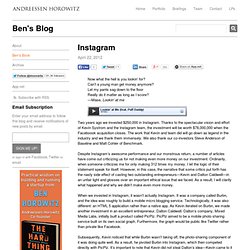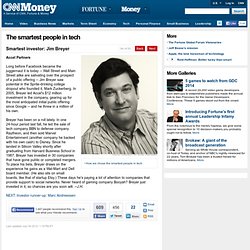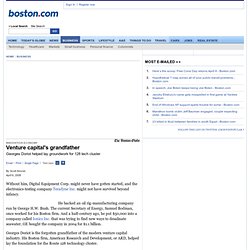

For Startup Accelerators, (Class) Size Does Matter - Venture Capital Dispatch. Instagram. Now what the hell is you lookin' for?

Can't a young man get money anymore? Let my pants sag down to the floorReally do it matter as long as I score? —Mase, Lookin’ at me Two years ago we invested $250,000 in Instagram. Thanks to the spectacular vision and effort of Kevin Systrom and the Instagram team, the investment will be worth $78,000,000 when the Faceboook acquisition closes. Despite Instagram’s awesome performance and our monstrous return, a number of articles have come out criticizing us for not making even more money on our investment.
When we invested in Instagram, it wasn’t actually Instagram. Subsequently, Kevin noticed that while Burbn wasn’t taking off, the photo-sharing component of it was doing quite well. Still, we needed to make a decision. Here’s how it looked then: So our choices were: a) invest in Dalton b) invest in neither or c) invest in Kevin and violate our commitment to Dalton. And that’s the thing that we did that many writers think was really stupid. How Andreessen Horowitz Bunted on an Instagram Investment. Johnnie: Elon Musk: "My proceeds from... Super Angel Investor Dave McClure Is Happy To Tell You Exactly How Much He's Worth. Why 500 Startups-Style Small Bets May Be Next Big Idea In Digital Health.
Great Leaders Series: Juan Trippe, Founder of Pan American Airways, Corporate Culture Article. Juan Trippe was perhaps the first American entrepreneur to think globally.

A Yale graduate who worked on Wall Street for a brief period, Trippe in his late twenties became interested in aviation. A quarter century after the Wright brothers' famous flight at Kitty Hawk, Trippe launched the business that eventually became known as Pan American World Airways. From the beginning he conceived of the carrier as an international operation, with service to exotic foreign destinations. Cornelius Vanderbilt Whitney was an early investor and Charles Lindbergh was a technical advisor. Pan Am's first seaplane flight departed Key West for Havana on October 19, 1927.
In the decade that followed, Trippe built the company into a powerhouse. Under Trippe's careful management, Pan Am developed a reputation for safety based on a strict training regimen for both its crewmembers and for its maintenance staff. The company reached its peak of financial success in the late 1960s. Back to the Greatest Leaders. The smartest people in tech - Smartest investor: Jim Breyer (36) - FORTUNE. Accel Partners Long before Facebook became the juggernaut it is today -- Wall Street and Main Street alike are salivating over the prospect of a public offering -- Jim Breyer saw potential in the Sprite-drinking college dropout who founded it, Mark Zuckerberg.

In 2005, Breyer led Accel's $12 million investment in the company, gearing up for the most anticipated initial public offering since Google -- and he threw in a million of his own. Breyer has been on a roll lately. In one 24-hour period last fall, he led the sale of tech company BBN to defense company Raytheon, and then sold Marvel Entertainment (another company he backed with his own cash) to Disney. Since he landed in Silicon Valley shortly after graduating from Harvard Business School in 1987, Breyer has invested in 30 companies that have gone public or completed mergers. The smartest people in tech - Investor runner-up: Marc Andreessen (37) - FORTUNE. Venture capital's grandfather. Without him, Digital Equipment Corp. might never have gotten started, and the electronics-testing company Teradyne Inc. might not have survived beyond infancy.

He backed an oil rig-manufacturing company run by George H.W. Bush. The current Secretary of Energy, Samuel Bodman, once worked for his Boston firm. And a half-century ago, he put $50,000 into a company called Ionics Inc. that was trying to find new ways to desalinate seawater; GE bought the company in 2004 for $1.1 billion. Georges Doriot is the forgotten grandfather of the modern venture capital industry. "After World War II, all the textile mills had gone away, and war time production was going away," says Spencer Ante, a Business Week editor who has written a new book on Doriot, "Creative Capital," that is hitting stores this week. When World War II began, President Roosevelt personally urged him to become a US citizen so he could assist with the war effort. Top employees began to splinter off.